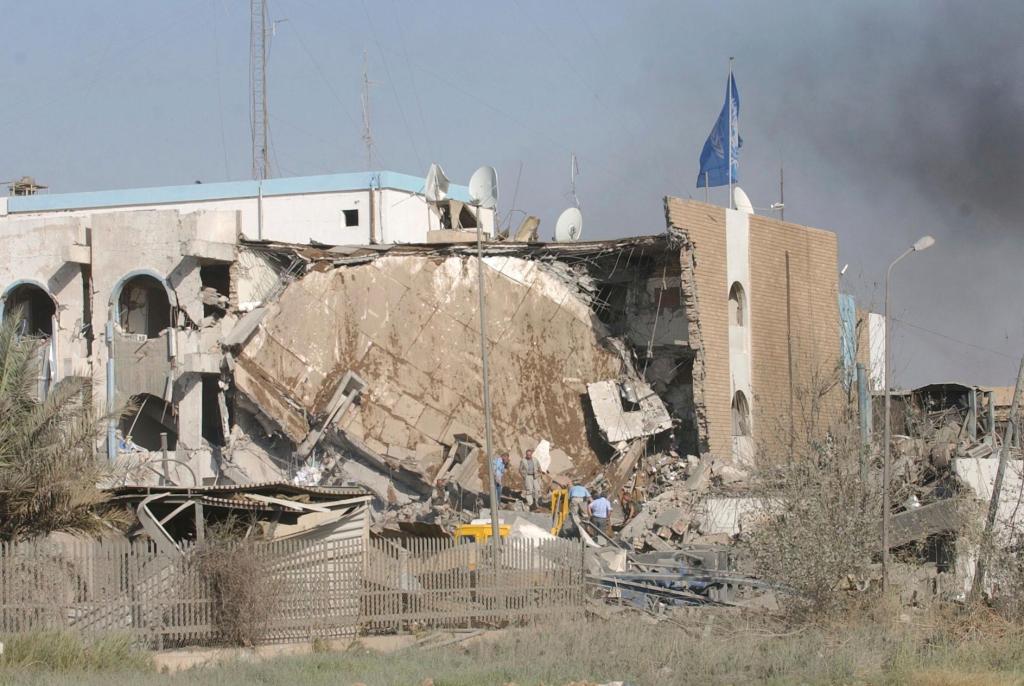
Officials commemorate 20th anniversary of deadly attack on UN headquarters in Iraq – The Denver Post
Last Updated on August 19, 2023 by Admin
[ad_1]

By QASSIM ABDUL-ZAHRA (Associated Press)
BAGHDAD (AP) — Iraqi and United Nations officials on Saturday marked the 20th anniversary of a deadly attack on the U.N. headquarters in Baghdad.
The Aug. 19, 2003, truck bomb attack on the Canal Hotel in Baghdad, which housed the U.N. headquarters in Iraq at the time, killed 22 U.N. staff including the head, Sergio Vieira de Mello, a rising U.N. star. It was the deadliest terrorist attack against U.N. staff in its history.
The attack came in the wake of the U.S.-led invasion of Iraq that toppled the dictator, Saddam Hussein, but unleashed an insurgency and years of brutal civil war.
At the commemoration ceremony held Saturday at the site of the attack, a hotel which has since been converted into a rehabilitation center for people struggling with addiction, the head of the U.N. Assistance Mission for Iraq, Jeanine Hennis-Plasschaert, said that the “wounds created by the 2003 attack – and the violence that came after it – run deep” and “may never fully heal.”
But Hennis-Plasschaert pointed to recent gains in Iraq’s stability and attempts by the current government to improve social services.
The past 20 years have been “a very rough road,” she said. “But throughout these years, the United Nations has not given up on its efforts to contribute to peace and stability in Iraq.”
Iraqi Foreign Minister Fouad Hussein, speaking at the event, called the attack “one of the most tragic incidents in the history of Iraq” and affirmed the country’s commitment to combating terrorism. As for the U.N. workers who lost their lives, he said, “their achievements will remain in the history of Iraq.”
U.N. Secretary-General António Guterres remembered the victims, saying the Canal Hotel tragedy “marked a change in the way humanitarians operate.”
“Although humanitarians are respected around the world, they may also be targeted by those who would do them harm,” he said in a statement that also paid tribute to aid workers everywhere.
Guterres said this year 250 million people in 69 countries need aid – 10 times more than at the time of the Canal Hotel bombing – but “sadly, funding is far off track.”
On Friday at U.N. headquarters in New York, officials held a silent commemoration attended by four survivors. U.N. spokesman Stéphane Dujarric later read out the names of the victims at the start of the U.N. daily briefing.
President of the U.N. General Assembly Csaba Kőrösi met briefly with some of the survivors. In a statement, he hailed “humanitarian workers, who race to save lives, and remain at crisis scenes long after the global spotlight dims.”
Darko Mocibob, one of the survivors, told The Associated Press he was in an office on the side of the blast talking on the phone to his boss in New York “and it was the last thing I remembered because I was knocked out cold for 20 to 30 minutes.” When he slowly regained consciousness, “not quite yet comprehending what happened,” he was on the ground, the room was in disarray with dust and overturned furniture, and he was bleeding, one of many U.N. staffers injured by flying glass.
Mocibob, who was visiting Baghdad from U.N. headquarters, recalled being helped to get out of the building, seeing bed sheets being torn up because there weren’t enough bandages, and being taken to an Iraqi hospital where doctors stitched up his head “and did a professional job” – but without anesthetic.
Now the director of the Middle East Division in the U.N. political office, Mocibob said the bombing “was a shock to the U,N. system” and changed it in many ways.
Initially, the U.N. retreated at the first sign of trouble anywhere, but then realized “we can’t operate like that and serve the people we’re supposed to serve,” he said. So a whole new professional U.N. system for safety and security was developed, and “the approach was changed from when to leave to how to stay,” including risk assessment and risk mitigation which is still in place.
Fatin Ishaya, who worked for the U.N. support office in Baghdad, told AP she was injured when part of the ceiling in her office fell on her head. But she said she was one of the least impacted and returned to work helping with the head count of victims, survivors and evacuations. “It took a toll on me,” she said.
Ishaya, who now works on security at U.N. headquarters in New York, said 20 years later she is still asking herself: “Why it happened? Why all these people lost their lives? Even the ones that survived, they live with the trauma.”
___
Associated Press writer Edith M. Lederer contributed to this report from the United Nations
[ad_2]
Source link




